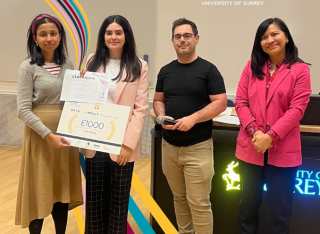
Dr Athina Ioannou
About
Biography
Athina is a Senior Lecturer in Business Analytics. She joined the University of Surrey in 2018 as a Research Fellow supporting the research activities in the EPSRC funded project “PriVELT” (PRIvacy-aware personal data management and Value Enhancement for Leisure Travellers). She has received her BSc in Finance (2011) from University of Macedonia, Greece with distinction, an MSc in Business Information Systems (2013) from City University London and her PhD degree in Computer Science (2018) from Brunel University London.
My qualifications
Affiliations and memberships
News
ResearchResearch interests
- Privacy and Data Management
- IT Innovation Adoption & Diffusion
- Adoption and use of emerging technologies such as Artificial Intelligence (AI)
- Adaptive and Maladaptive uses of IT (such as Technostress) and their individual, organisational and social consequences
- Mindfulness in IS
- Business Intelligence and Machine Learning
Research projects
The PriVELT Project (2018 - 2021) involves a group of researchers working in five academic disciplines (Computer Science, Tourism and Hospitality Management, Psychology, Business, Law) at four UK universities (University of Kent, University of Surrey, University of Warwick, Durham University). The project is led by Prof Shujun Li of Kent Interdisciplinary Research Centre in Cyber Security (KirCCS), the University of Kent. It has an overall budget of £1.4m, with 80% (£1.12m) funding from Engineering and Physical Sciences Research Council (EPSRC). PriVELT will address the two-sided challenges associated with offering a seamless and highly personalised end-to-end travel experience while balancing the privacy and security needs of leisure travellers. PriVELT aims to develop an innovative user-centric and privacy-aware digital platform that will empower leisure travellers to better manage the sharing of their personal data with travel service providers and other entities and foster new business opportunities for the travel and tourism industry through encouraging better (more transparent and effective) usage of travellers' data. Surrey's researchers: Iis Tussyadiah (PI), Prof Annabelle Gawer (CI), and Dr Athina Ioannou (RF).
Indicators of esteem
2017, August. Best Paper Award in SIGADIT Track.Twenty-third Americas Conference on Information Systems, Boston, USA. Title 'Using IT Mindfulness to mitigate the negative consequences of technostress' (with Anastasia Papazafeiropoulou).
Research interests
- Privacy and Data Management
- IT Innovation Adoption & Diffusion
- Adoption and use of emerging technologies such as Artificial Intelligence (AI)
- Adaptive and Maladaptive uses of IT (such as Technostress) and their individual, organisational and social consequences
- Mindfulness in IS
- Business Intelligence and Machine Learning
Research projects
The PriVELT Project (2018 - 2021) involves a group of researchers working in five academic disciplines (Computer Science, Tourism and Hospitality Management, Psychology, Business, Law) at four UK universities (University of Kent, University of Surrey, University of Warwick, Durham University). The project is led by Prof Shujun Li of Kent Interdisciplinary Research Centre in Cyber Security (KirCCS), the University of Kent. It has an overall budget of £1.4m, with 80% (£1.12m) funding from Engineering and Physical Sciences Research Council (EPSRC). PriVELT will address the two-sided challenges associated with offering a seamless and highly personalised end-to-end travel experience while balancing the privacy and security needs of leisure travellers. PriVELT aims to develop an innovative user-centric and privacy-aware digital platform that will empower leisure travellers to better manage the sharing of their personal data with travel service providers and other entities and foster new business opportunities for the travel and tourism industry through encouraging better (more transparent and effective) usage of travellers' data. Surrey's researchers: Iis Tussyadiah (PI), Prof Annabelle Gawer (CI), and Dr Athina Ioannou (RF).
Indicators of esteem
2017, August. Best Paper Award in SIGADIT Track.Twenty-third Americas Conference on Information Systems, Boston, USA. Title 'Using IT Mindfulness to mitigate the negative consequences of technostress' (with Anastasia Papazafeiropoulou).
Teaching
- Foundations of Statistics and Econometrics (MANM467)
- Fundamentals of Business Analytics (MAN2188)
Publications
Against the backdrop of advancements in technology and its deployment by companies and governments to collect sensitive personal information, information privacy has become an issue of great interest for academics, practitioners, and the general public. The travel and tourism industry has been pioneering the collection and use of biometric data for identity verification. Yet, privacy research focusing on the travel context is scarce. This study developed a valid measurement of Travelers’ Online Privacy Concerns (TOPC) through a series of empirical studies: pilot (N=277) and cross-validation (N=287). TOPC was then assessed for its predictive validity in its relationships with trust, risk, and intention to disclose four types of personal data: biometric, identifiers, biographic, and behavioral data (N=685). Results highlight the role of trust in mitigating the relationship between travelers’ privacy concerns and data disclosure. This study provides valuable contribution to research and practice on data privacy in travel.
In light of mounting privacy concerns over the increasing collection and use of biometric and behavioral information for travel facilitation, this study examines travelers’ online privacy concerns (TOPC) and its impact on willingness to share data with travel providers. A proposed theoretical model explaining antecedents and outcomes of TOPC related to biometric and behavioral data sharing was tested using structural equation modeling with data collected from 685 travelers. The results extend the Antecedents – Privacy Concerns – Outcomes (APCO) framework by identifying a set of salient individual factors that shape TOPC. The findings provide empirical evidence confirming the context dependence of privacy preferences, showing that although travelers are concerned over their information privacy they are still willing to share their behavioral data; while in the case of biometric information, the disclosure decision is dependent upon expected benefits rather than privacy concerns. This study offers insights into privacy behavior of online consumers in the travel context and constitutes one of the few focusing on the social aspects of biometric authentication.
Digital technologies shape travel environments. Noticing online privacy issues, consumers can hold distinct attitudes towards disclosing personal information to service providers. We conducted a panel survey to gauge travelers' willingness to share personal information with service providers, provided with different types of nudges. Based on the results of clustering analysis, two segments were identified: travelers who are reasonably willing to share (Privacy Rationalists) and those who are reluctant to share (Privacy Pessimists). This study provides empirical evidence of privacy segmentations in the travel context, which has not been reported before and thus deserves more attention from both researchers and practitioners.
Although there are many privacy-enhancing tools designed to protect users’ online privacy, it is surprising to see a lack of user-centric solutions allowing privacy control based on the joint assessment of privacy risks and benefits, due to data disclosure to multiple platforms. In this paper, we propose a conceptual framework to fill the gap: aiming at user-centric privacy protection, we show that the framework can assess not only privacy risks in using online services but also the added values earned from data disclosure. Through following a human-in-the-loop approach, it is expected that the framework can provide a personalized solution via preference learning, continuous privacy assessment, behavioral monitoring and nudging. Finally, we describe a case study about “leisure travelers” and some areas for further research.
Research in the IS field has been focusing on investigating the adverse effects of ICT usage such as technostress. Nevertheless, few studies have investigated mechanisms for the alleviation of this phenomenon. This study contributes to the technostress literature by adopting a mindfulness perspective that has not been investigated before. In this paper, we aim to explore the role of IT mindfulness as a buffer to technostress stressors as well as a mechanism that can mitigate the negative consequences arising from extended ICT usage within organizational settings. By following a survey based approach and exploring a sample of 440 working individuals, our SEM analysis revealed that IT mindfulness constitutes a potential further mechanism that can effectively reduce technostress conditions, enhance user satisfaction while utilizing ICT’s for work tasks and improve task performance. Further research is proposed into expanding the proposed model, exploring the influence of IT mindfulness on additional organizational outcomes.
This study investigates the effects of mindfulness, an important personality trait, on people's perceptions of privacy. Using protection motivation theory as a conceptual foundation, the central tenet is that mindfulness plays an important role in people's threat appraisal process of privacy concerns and thus influences one's intention to share personal information online. A survey-based approach was employed to measure privacy attitudes of 685 UK individuals about online data disclosure. Our findings demonstrate that mindfulness contributes to the formation of privacy concerns. A more mindful consumer is more likely to adopt a more objective appraisal style, interpret privacy threats as less threatening, and thus share personal information online
As artificially intelligent conversational agents (ICAs) become a popular customer service solution for businesses, understanding the drivers of user acceptance of ICAs is critical to ensure its successful implementation. To provide a comprehensive review of factors affecting consumers' adoption and use of ICAs, this study performs a systematic literature review of extant empirical research on this topic. Based on a literature search performed in July 2019 followed by a snowballing approach, 18 relevant articles were analyzed. Factors found to influence human-machine cognitive engagement were categorized into usage-related, agent-related, user-related, attitude and evaluation, and other factors. This study proposed a collective model of users' acceptance and use of ICAs, whereby user acceptance is driven mainly by usage benefits, which are influenced by agent and user characteristics. The study emphasizes the proposed model's context-dependency, as relevant factors depend on usage settings, and provides several strategic business implications, including service design, personalization, and customer relationship management.
The wide deployment of digital technologies for the management of the COVID-19 pandemic has triggered concerns about privacy and intrusion from government surveillance. This study investigates individual privacy and surveillance attitudes by developing a theoretical model to explain acceptance of government surveillance and privacy protection behaviours during health-crises, such as the COVID-19 pandemic. Results from a US sample reveal that people are concerned about the collection and use of their personal information via mobile applications and the monitoring of their online activities by authorities. Findings reveal the important roles of political trust and belief that governments' need to be proactive in protecting peoples’ welfare during a crisis that can increase acceptance of surveillance and thus assist in the management of the health crisis. Implications for research and practice are discussed
This paper investigates privacy concerns in smart tourism, in which personal data fuels systems and services developed to enhance tourists’ experiences. A mixed-methods approach, involving semi-structured interviews (N = 34) and a survey among travellers from the UK and Spain (N = 1,019), was adopted. Findings from the qualitative study suggest that privacy concerns in smart tourism are built on preceding factors, including risk associated with use of different types of technology, past experiences with data misuse, and unawareness of data management practices. To cope with these, tourists adopt different strategies to protect their data. Results from the quantitative study reveal that privacy concerns influence actual behaviours and limit data disclosure. Different agents managing tourists’ personal data generate varying levels of privacy concerns. These findings have critical implications for tourism organizations and policy makers, posing the need to rethink the ramifications of smart tourism development for tourists and to devise appropriate strategies to address them.
IT offers significant benefits both to individuals and organisations, such as during the Covid-19 pandemic where technology played a primary role in aiding remote working environments; however, IT use comes with consequences such as ‘technostress’ – stress arising from extended use of technology. Addressing the paucity of research related to this topic, in this study, we examine the role of mindfulness and IT mindfulness to both mitigate the impact of technostress and alleviate its negative consequences; revealing that mindfulness can reduce technostress and increase job satisfaction, while IT mindfulness can enhance user satisfaction and improve task performance. Moreover, our work sheds light on the under-researched relationship between mindfulness and IT mindfulness; showing that the latter has a stronger influence on IT related outcomes; revealing the valuable role of mindfulness and IT mindfulness in the workplace and offering important implications to theory and practice.
INTRODUCTION: Many online services use data-sharing nudges to solicit personal data from their customers for personalized services. OBJECTIVES: This study aims to study people’s privacy preferences in sharing different types of personal data under different nudging conditions, how digital nudging can change their data sharing willingness, and if people’s data sharing preferences can be predicted using their responses to a questionnaire. METHODS: This paper reports a machine learning-based analysis on people’s privacy preference patterns under four different data-sharing nudging conditions (without nudging, monetary incentives, non-monetary incentives, and privacy assurance). The analysis is based on data collected from 685 UK residents who participated in a panel survey. Their self-reported willingness levels towards sharing 23 different types of personal data were analyzed by using both unsupervised (clustering) and supervised (classification) machine learning algorithms. RESULTS: The results led to a better understanding of people’s privacy preference patterns across different data-sharing nudging conditions, e.g., our participants’ preferences are distributed in a space of 48 possible profiles more sparsely than we expected, and the unexpected observation that all the three data-sharing nudging strategies led to an overall negative effect: they led to a reduced level of self-reported willingness for more participants, comparing with the case of no nudging at all. Our experiments with supervised machine learning models also showed that people’s privacy (data-sharing) preference profiles can be automatically predicted with a good accuracy, even when a small questionnaire with just seven questions is used. CONCLUSION: Our work revealed a more complicated structure of people’s privacy preference profiles, which have some dependencies on the type of data nudging and the type of personal data shared. Such complicated privacy preference profiles can be effectively analyzed using machine learning methods, including automatic prediction based on a small questionnaire. The negative results on the overall effect of different data-sharing nudges imply that service providers should consider if and how to use such mechanisms to incentivise their consumers to share personal data. We believe that more consumer-centric and transparent methods and tools should be used to help improve trust between consumers and service providers.
Traditionally most cross-selling models in retail banking use demographics information and interactions with marketing as input to statistical models or machine learning algorithms to predict whether a customer is willing to purchase a given financial product or not. We overcome with such limitation by building several models that also use several years of account transaction data. The objective of this study is to analysis credit card transactions of customers, in order to come up with a good prediction in cross-selling products. We use deep-learning algorithm to analyze almost 800,000 credit cards transactions. The results show that such unique data contains valuable information on the customers’ consumption behavior and it can significantly increase the predictive accuracy of a cross-selling model. In summary, we develop an auto-encoder to extract features from the transaction data and use them as input to a classifier. We demonstrate that such features also have predictive power that enhances the performance of the cross-selling model even further.
The digitally disruptive environment has evolved rapidly due to the introduction of new advancements within the field of smart applications. Applications of one of the most prominent technologies, Internet of Things (IoT), often appear in the retail sector, where smart services have transformed the customer experience holistically. Presented in this paper are the findings from an exploratory field study in the retail service sector, which drew on the views of experienced practitioners about the smart store experience and the associated changes. The paper presents an overview of the drivers of smart retail service diffusion and the relevant challenges, such as the business expectations and the heterogeneity of devices. The arising themes indicate that IoT security is a major challenge for businesses installing IoT devices in their journey towards smart store transformation. The paper highlights the importance of a secure data-sharing IoT environment that respects customer privacy as the smart experience in-store offers data-driven insights and services. Implications for research and practice are discussed in terms of the customer experience relevant to the identified challenges.




